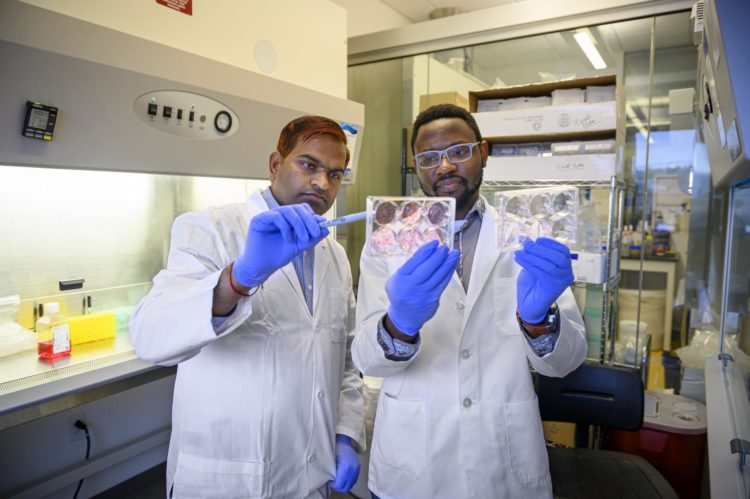Findings could one day lead to improved outcomes for breast cancer patients

Credit: Photo by Cori Kogan, WSU Health Sciences Spokane
SPOKANE, Wash. – Treatment for breast cancer commonly includes radiation therapy, which offers good chances of success but comes with a serious long-term side effect: toxicity due to radiation that reaches the heart, causing DNA damage in healthy heart cells. Over time, this can lead to heart disease and eventually heart failure.
A new study conducted by researchers in the Washington State University College of Pharmacy and Pharmaceutical Sciences suggests that a preventive solution may lie in the biological clock, the built-in time-keeping mechanism that keeps us on a 24-hour cycle of rest and activity and regulates a wide variety of processes in our bodies.
Published in the FASEB Journal, their study used a rodent model to determine whether the biological clock is involved in heart toxicity from radiation therapy and could be used as part of a strategy to reduce this toxicity. Their findings showed that after receiving a dose of radiation to the heart, mice with disrupted biological clocks had significantly worse heart function than control mice.
In addition, the researchers demonstrated that a protein known as Bmal1–which drives 24-hour rhythms in the expression of many genes–plays an important role in protecting the heart from radiation-related damage.
“Our findings suggest that Bmal1 serves as a biomarker for the susceptibility to radiation-induced DNA damage to the heart,” said Shobhan Gaddameedhi, an assistant professor in the Department of Pharmaceutical Sciences and the study’s senior author.
Though more research is needed, the researchers are hopeful that their discovery could someday be used to improve treatment outcomes for breast cancer patients. Panshak Dakup–the study’s first author and a PhD in pharmaceutical sciences student–said their finding holds promise for personalized medicine. “For example, in breast cancer patients who have a long history of working night shifts, the expression of biological clock proteins such as Bmal1 may be compromised, and it could be that radiation therapy is not the best option for them.”
Gaddameedhi added that it could also be used to optimize the timing of radiation therapy so it is provided when a patient’s Bmal1 level offers the greatest level of protection from heart damage. That timing may vary depending on a person’s chronotype–whether they are early birds or night owls–as well as on other factors that influence the status of the master biological clock, such as shiftwork or frequent travel across time zones.
Dakup conducted the experiments for the study as part of a predoctoral fellowship supported by the American Heart Association. Additional major support for the study came from the National Institutes of Health.
In the study’s main experiment, Dakup looked at the heart function of two groups of mice with disrupted clocks, as compared to that of control mice. One group had a genetic mutation that eliminated Per1 and Per2–two genes that control the body’s master biological clock. The second group were wild-type mice that were put on a simulated rotating shift schedule in which light-dark cycles were reversed weekly, throwing off their clocks. The control group consisted of wild-type mice with healthy biological clocks that were on a simulated day shift schedule. All mice received radiation treatment to the chest that included all of the heart.
Collaborating with assistant professor of pharmaceutical sciences and cardiovascular biology expert Zhaokang Cheng, Dakup used ultrasound echocardiography technology to compare heart function among the three groups, both prior to and up to six weeks after radiation treatment. In clock-disrupted mice, the heart’s ability to pump blood out and into circulation was compromised due to a loss of elasticity in the heart ventricle. Those mice also had more heart scar tissue than control mice.
Additional analyses focused on determining a potential relationship with the biological clock protein Bmal1. The researchers showed that Bmal1 levels across 24 hours were significantly lower in clock-disrupted mice versus control mice and peaked at a later time. They also found that higher levels of Bmal1 were associated with lower DNA damage levels, and vice versa.
Finally, the researchers found that Bmal1 interacts with the BRCA1, BRCA2, and ATM genes, three DNA damage response genes they said are important in fighting against radiation-induced DNA damage and cell death.
“When Bmal1 binds to these genes, it is potentially trying to elevate or activate their function against the collateral damage caused by radiation therapy,” Gaddameedhi said.
The researchers’ next step is to test their hypothesis in a cancer model. This will help them pin down the exact mechanism by which the biological clock protects the heart from radiation damage. They could then use this knowledge to develop new treatment strategies to minimize heart damage while maximizing the ability to kill tumor cells. Any such strategies would first need to be tested in clinical trials before they could be adopted.
###
In addition to Gaddameedhi, Dakup, and Cheng, study authors also included Kenneth Porter, Rajendra Gajula, and Peeyush Goel.
Media Contact
Connie Young
[email protected]
509-368-6679
Original Source
https:/
Related Journal Article
http://dx.





